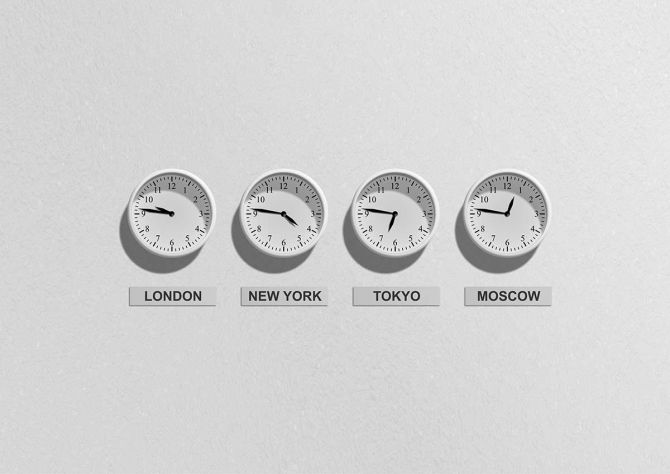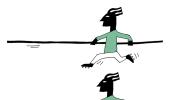In a world without politics, time zones would change by an hour for a shift of 15 degrees of longitude.
But, of course, political considerations apply, explains Devangshu Datta.

On Monday, March 27, 2023, millions of Lebanese Muslims woke before sunrise to eat their Suhur, before starting the dawn-to-sunset fast for Ramadan.
According to them, the sun rose at 5.32 am. However, as far as their Christian neighbours were concerned, it was already 6.32 am!
This situation where time depended on the observer's religious affiliations was due to Lebanon's complicated demographics.
A large chunk of its population (about 5 million) is Christian, and the rest are mostly Muslims.
Communal tension was one of the causes of the long-running Civil War (1975-1990) and there's been no census since 1932.
Lebanon's time zone is UTC (Universal Time) plus two hours in winter -- it is three hours and 30 minutes behind Indian Standard Time (IST).
After the last Sunday of March, it switches to Daylight Saving Time (DST) setting clocks forward by one hour.
Post-DST, the sunset when the fast ends would be an hour later. So, Prime Minister Najib Mikati proposed to delay DST until Ramadan ended.
The Christians decided to go ahead with DST anyway, leading to utter confusion!
The Lebanese government then decided switch to DST on Wednesday (March 29).
Time zone politics can lead to other types of weirdness.
At the land border between China and Kyrgyzstan for instance, travellers reset mobiles by two hours. Kyrgyzstan's time zone is two hours behind China.
Travelling from West Bengal via Bangladesh to Assam would mean switching forward by 30 minutes, and back again as you enter Assam.
Assam and the North East incidentally use an informal 'Garden Time', an hour ahead of IST.
China, despite stretching 5,000 km from East to West, has only one time zone when it could have three. So did the Indian subcontinent under the Raj (Pakistan and Bangladesh reset after Partition).
The US has 11 time zones, as does Russia. France is the record-holder with 12 time zones due to possessions in the South Pacific, and on South America's Atlantic coast.
The principles behind time calculations are easy to understand.
Local noon (1200) happens when the sun is directly overhead and casts the least shadow. Due to the Earth's rotation, this happens earlier in the East.
In a world without politics, time zones would change by an hour for a shift of 15 degrees of longitude.
But, of course, political considerations apply.
Mao Zedong believed maintaining one time zone would help unify China, even if it meant Urumqi citizens rising at dawn to clock into office at 9 am.
In earlier eras, different nations calculated times from some convenient longitude.
The UK's zero meridian was at Greenwich, an observatory near London, while the French used the Paris Meridian as zero.
Standardising time zones started with the advent of the railways, when the need became imperative.
Eventually, Greenwich became the world's zero meridian and Greenwich Mean Time (GMT) became UTC.
Indian Standard Time used to be called 'Railway Time'. It is the local time for 82.5 degrees East -- that's the meridian at the confluence of the Ganga and the Yamuna.
Assam uses Garden Time, which is set an hour ahead because work in tea gardens (and other agrarian activities) are, perforce, tied to local sunrise and sunset.
As societies become technologically advanced, the need to slice time into exponentially smaller segments occurs.
To take an example, a civil airliner flying at 700 kmph moves almost 12 km a minute and by a km every 5 seconds.
Air traffic controllers need very accurate position data that depends on accurate time data.
I may have Rs 1,000 in my bank account and I might try to simultaneously buy two items online, each of which is priced at Rs 1,000.
Which order will be serviced, and which refused?
This depends on time-stamping, which may vary by micro seconds.
In mobile network management, or military applications, or fusion reaction calculations, or ISRO's rocket launches, far more precision is required.
But whether you are trying to observe a time-bound fast or catch a flight, the principle is the same: You need to know the time and know it to increasing degrees of precision depending on the task.
Feature Presentation: Ashish Narsale/Rediff.com












 © 2025
© 2025